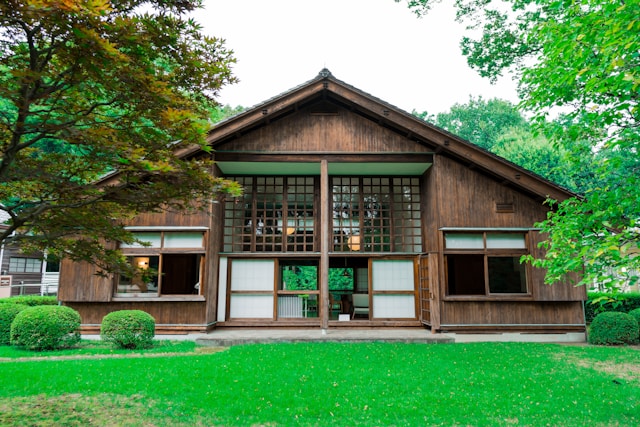
In recent years, more and more digital nomads have chosen to live in rural Japan, enjoying the peaceful environment and unique cultural experiences. However, living in rural Japan is not a simple matter; it requires thorough preparation, especially regarding visas, work, and other aspects of daily life. This article will provide you with some advice and guidance from these perspectives.
Let’s take a look at the choices made by Maigomika in her video “What we do for work in the Japanese countryside, our visa, & tips we wish we had known beforehand.” This YouTuber shared information about how to apply for a visa and live in rural Japan, and we will explore her decisions:
1. Hiring a Visa Lawyer
Maigomika pointed out that finding a visa lawyer is the most crucial part if you’re not entirely confident about the process.
“If your ideal job can’t help, or if you just want to figure out your options, handling the visa application process on your own is nearly impossible unless you have an immigration expert. Immigration experts are lawyers, legal assistants, or administrative scriveners qualified to prepare legal documents related to administrative matters like immigration.
Frankly, neither Jesse nor I would be in Japan without an immigration lawyer.
They are an invaluable resource for visa issues, explaining the complexities of applications, preparing documents on our behalf, and helping alleviate the stress associated with these applications. If they only speak Japanese, bring an electronic translator or find a Japanese friend willing to help with translations. Offer your friend help with chores, or help clean their house for a year—whatever it takes, make sure you save up for a lawyer.”
2. Becoming a Language Teacher
Becoming a language teacher is the fastest way for non-Japanese speakers to live in rural Japan. Maigomika reflects in her video:
“I hope our experience can help others. Here are a few key tips for those considering moving to Japan under similar circumstances.
Get a job teaching English. I know, I know, it’s not what most people want to hear.
Although this is certainly not the only way to find work in Japan, teaching English was the most stable way for us to establish ourselves in Japan. You can open a bank account, find an apartment, and obtain an address to register at the municipal office. It allowed us to explore our options, build networks, and develop skills relevant to the work we wanted to do, all while earning a steady monthly income. Initially, making this decision seemed like a daunting step. Jesse and I were hesitant about becoming teachers in Japan, but we knew it was a necessary compromise to achieve our long-term goals.”
3. Understanding Visa Types
Since Japan does not offer a free digital nomad visa, it is essential to understand the types of visas available. Let’s look at Maigomika’s choice:
“I work remotely for an inbound media company in Japan. It sounds complicated, but simply put, my tasks involve English writing, SEO design work, editing, and many other responsibilities. Although finding a job in a specialized field was challenging, Jesse found work as a blacksmith. This was thanks to his past experience in metalworking, which provided the necessary credibility and recommendation letters for his current visa application.
We hold an Engineer/Humanities Specialist/International Services visa. This is one of the most broadly applicable work visas you can obtain in Japan. The types of businesses and professions covered by this visa are diverse, including teachers, accountants, corporate salespeople, and more. The visa’s criteria are based on two factors: your relevant academic and professional background, and whether, as a foreigner, you possess skills that are difficult for Japanese nationals to fulfill.
In our case, our work relates to these two factors. Our English skills and foreign perspectives, combined with our professional experience, enabled us to find work in Japan.
Although English proficiency is a necessary skill for our jobs, we also needed Japanese language ability. When we first arrived in Japan, we didn’t immediately land our current jobs. Like many others, we came to Japan by teaching English. Jesse joined the JET program, while I found a position at an English conversation school called Nakaiwa. Our employers handled the relevant paperwork and helped us settle in Japan.
We were able to find an apartment, open a bank account, and register at the municipal office. While teaching English, we actively sought new opportunities to broaden our horizons. This period was very valuable for us, as it allowed us to explore the job market, discover effective networking methods, and work on developing transferable skills that made us more attractive candidates for other career paths in Japan. Finding a job in Japan is similar to job hunting elsewhere in many ways. For me, writing became one of the many important skills I developed. Coming from a design background with experience working on various client projects, including my own, writing became a natural extension of my skills. I learned how to write articles for blogs and websites, actively engaged in social media, and built connections both online and offline. Eventually, my online portfolio and past professional experience led me to meet people at my current company. I wish I could say it was a quick and easy transition, but it actually took some time to move from teaching to more independent work. In the first three years, Jesse worked full-time for JET while continually seeking and visiting potential shops. He attended classes and met with other blacksmiths, becoming a familiar face until he finally found his opportunity. Our journey in Japan has been like a rollercoaster, and the road ahead is still full of uncertainty.”
Key Takeaways from the YouTuber’s Experience. Digital nomads who wish to live in rural Japan should pay attention to the following:
1. Visa Types and Application
Work Visas
For digital nomads aiming to live and work in Japan long-term, the visa is the first consideration. Japan offers several types of work visas, with the most common including:
– Engineer/Humanities Specialist/International Services Visa : Suitable for digital nomads working in IT, translation, international business, marketing, etc. This visa covers a broad range of occupations and requires applicants to have relevant academic or professional backgrounds.
– Self-Employment Visa : If you’re a freelancer or plan to start a business in Japan, this visa might be more appropriate. However, it is more challenging to obtain, often requiring proof of the feasibility and stability of your business in Japan.
Short-Term Stay Visa
If you plan to live in Japan for a short period, you may consider applying for a 90-day short-term business or tourist visa. This visa does not allow you to work in Japan but can serve as a starting point for exploring local life.
2. Job Opportunities and Arrangements
Remote Work
Most digital nomads sustain themselves through remote work. Japan’s internet infrastructure is highly developed, and even in some remote rural areas, high-speed internet is available, allowing digital nomads to work online smoothly.
Local Employment Opportunities
If you plan to find local work in rural Japan, you may need Japanese language skills and an understanding of the local job market. Agriculture, crafts, and inn management are some common job opportunities in rural areas. Many rural regions are also actively attracting foreigners to participate in local revitalization projects, which could provide you with employment opportunities.
Diversified Income Sources
To reduce living costs and risks, digital nomads usually diversify their income sources. In addition to remote work, you can consider increasing your income by teaching English, selling crafts, providing translation services, etc.
3. Living Costs and Environmental Adaptation
Living Costs
The cost of living in rural Japan is relatively low, but you still need to consider expenses such as rent, transportation, and daily necessities. Compared to big cities, housing options in rural areas are more diverse, and rent is generally cheaper. You can choose traditional Japanese houses (such as vacant houses or “akiya”) as your residence, which are often affordable and full of character.
Cultural Adaptation
The cultural atmosphere in rural Japan is quite different from that in big cities, typically more traditional and conservative. Digital nomads need to respect local culture and customs and may need some Japanese language skills to integrate into community life.
Healthcare and Insurance
Foreigners living in Japan need to join the national health insurance. Medical facilities in rural areas may not be as developed as in big cities but can usually meet basic healthcare needs. For digital nomads living in remote areas, it is recommended to understand the nearby medical resources in advance and prepare an emergency plan.
4. Legal and Administrative Support
Legal Consultation
Due to the complexity of issues such as visa applications, taxes, and residence permits, it is recommended that you consult a professional legal advisor or immigration lawyer before making decisions to ensure you understand all legal requirements and risks.
Networking and Social Support
Joining digital nomad communities, online forums, or social media groups can help you gain more information and support. Interacting with other digital nomads living in Japan can help you better adapt to local life.
Conclusion
Living in rural Japan is an attractive but also challenging choice for digital nomads. Successfully settling in rural Japan and leading an ideal life requires digital nomads to make thorough preparations, including choosing the right visa, finding stable work, and adapting to the local cultural environment. I hope the above suggestions provide valuable insights to help you better plan your future life in rural Japan.
This article refers to the following video:
If you have more questions or need help with tax planning, identity planning, consultation, immigration, or digital nomad assistance, feel free to leave a comment or add our official WeChat for more professional services.





